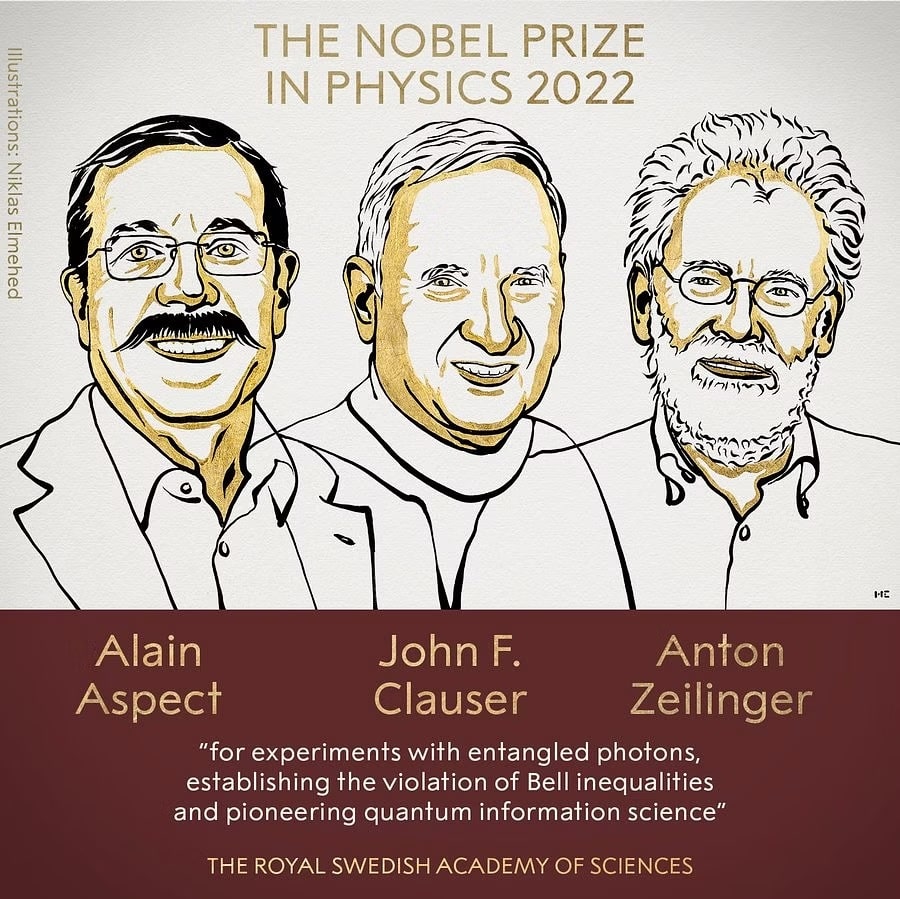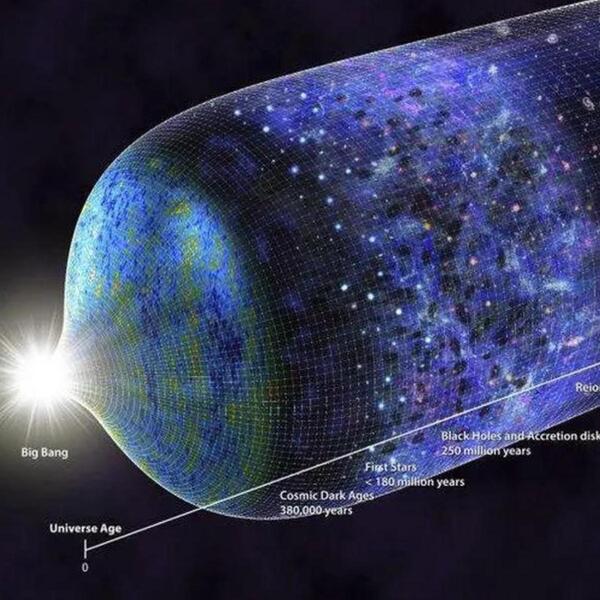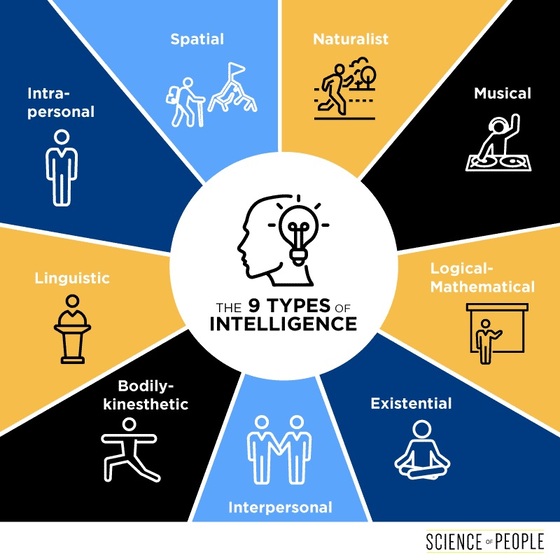 The year 2022 proved to be a remarkable milestone in the world of physics with the prestigious Nobel Prize being awarded to Alain Aspect, John F. Clauser, and Anton Zeilinger for the groundbreaking discovery of quantum entanglement.
The year 2022 proved to be a remarkable milestone in the world of physics with the prestigious Nobel Prize being awarded to Alain Aspect, John F. Clauser, and Anton Zeilinger for the groundbreaking discovery of quantum entanglement.
Quantum entanglement is a mysterious and fascinating phenomenon in the world of quantum physics. Imagine two tiny particles, like electrons, that become connected in a very special way. When these particles are entangled, their properties become linked, no matter how far apart they are from each other. For example, let's say we have two entangled electrons. If we measure the spin (a property related to their angular momentum) of one particle and find it to be "up," the other entangled particle's spin will instantly be "down," even if it's on the other side of the universe. Or if we turn one of the entangled particles clockwise, then instantly the second particle will turn anti-clockwise, even if it's millions of light years away.

In simple terms, quantum entanglement is like a magical connection between particles that allows them to communicate with each other instantly, no matter how far apart they are. This may sound like magic, but it's a real and proven phenomenon. Scientists don't fully understand how or why entanglement happens, but it's a crucial part of quantum physics. It challenges scientists' classical understanding of how the world works. In the classical world, the scientific understanding is that events happen due to causes, and objects can only influence each other if they are close to each other. This is known as causality and locality. However, this "action at a distance" of quantum entanglement has defied the classical understanding of causality and locality because there is no apparent exchange of information or force between the particles. It's as if they are somehow connected beyond the boundaries of space and time.
Science has traditionally relegated questions about the existence of God to the domains of philosophy, theology, and personal beliefs, mainly due to the lack of tangible experimental proof or evidence. However, the mind-boggling discoveries of quantum mechanics have expanded the boundaries of science, inviting philosophical contemplation beyond empirical observations. The once-prevailing reason to dismiss the possibility of God's existence, the lack of experiences transcending space, time, causality, and locality, is no longer sufficient. Quantum phenomena like entanglement, superposition, teleportation, and the observer effect challenge the notion that supernatural powers attributed to God are inherently unscientific. These mysterious powers are now observed and experienced by scientists.

Each new revelation in quantum mechanics compels scientists to reassess their previous certainties. While some scientists may not fully embrace theism, the enigmatic nature of the quantum world encourages a more open-minded stance of agnosticism.
Who is God? What is the nature of God? Why does He seem hidden and not reveal Himself in a tangible way? If there is an omnipotent and compassionate God, why does suffering exist in the world? What significance does caring for God hold in the grand scheme of things? If there are compelling and satisfactory answers were provided to these questions, an agnostic person would be freed from entanglement of doubts and agnosticism. We shall attempt here to provide such answers based on teachings of His Divine Grace A. C. Bhaktivedanta Swami Prabhupada from Vedic Literatures like Bhagavad Gita and Srimad Bhagavatam.
1. Who is God?
God is the Supreme Personality of Godhead, also known as Krishna. He is the source of all creation, the ultimate reality, and the foundation of existence. There is more precise definition given by Parasara Muni:
ऐश्वर्यस्य समग्रस्य वीर्यस्य यशसः श्रियः।
ज्ञानवैराग्ययोश्चैव षण्णां भग इतीरणा॥
“God is the reservoir of all transcendental qualities. He is full with six kinds of opulences, namely wealth, strength, fame, beauty, knowledge, and renunciation.”
Such Personality is Krishna who is all-beautiful, all-knowing, all-powerful, all-wealthy, all-famous and the top most renunciant being.
2. What is the nature of God?
Krishna is present in three phases: In His Brahman aspect as the all-pervading spiritual energy, In His Paramatma aspect as the Supersoul residing within all living beings, guiding their actions impartially, and in His Bhagavan aspect as the enchanting Supreme Personality, engaging in loving exchanges and enchanting pastimes with His devotees in his eternal abode.

3. Why does He seem hidden and not reveal Himself in a tangible way?
Krishna has manifested this material world for those living entities who desired to imitate God and live separately from Him. Within this realm, Krishna allows such entities to believe that there is no God, thereby facilitating their desire for independence. Even when He descends to protect His devotees, Krishna keeps His divine identity hidden from those who are not devoted to Him. This He declares in Bhagavad Gita 7.25 as following:
नाहं प्रकाश: सर्वस्य योगमायासमावृत: ।
मूढोऽयं नाभिजानाति लोको मामजमव्ययम् ॥ २५ ॥
“I am never manifest to the foolish and unintelligent. For them I am covered by My internal potency, and therefore they do not know that I am unborn and infallible.”
Krishna is completely independent and beyond our comprehension, and He chooses to reveal Himself to His sincere devotees in various ways, depending on their level of surrender and purity of consciousness.
4. If there is an omnipotent and compassionate God, why does suffering exist in the world?
The presence of suffering in the material world is a consequence of the law of karma, established by Krishna to govern this realm. Each living being has free will and makes choices that lead to both happy and distressful consequences. The living entities come to this world for independent enjoyment and for lording over other living entities. This is evident from ever going march of human beings to dominate other individually or collectively. While engaged in this pursuit of dominance if they give suffering to other living entities they become entitle to suffer resultant reactions. Conversely, when they adhere to the laws prescribed by Krishna, they experience happy consequences.
5. What significance does caring for God hold in the grand scheme of things?
By caring for God and serving Him with devotion, the soul can achieve liberation from the material world and attain eternal spiritual existence in Krishna's loving association.















